The Pakistan Breakfast was held on 18th January 2023 at Davos, Switzerland. It was held under the auspices of the Pathfinder Group, which is also co-hosted by UBank. The event was moderated by Zarrar Sehgal, Chairman Pathfinder Group.
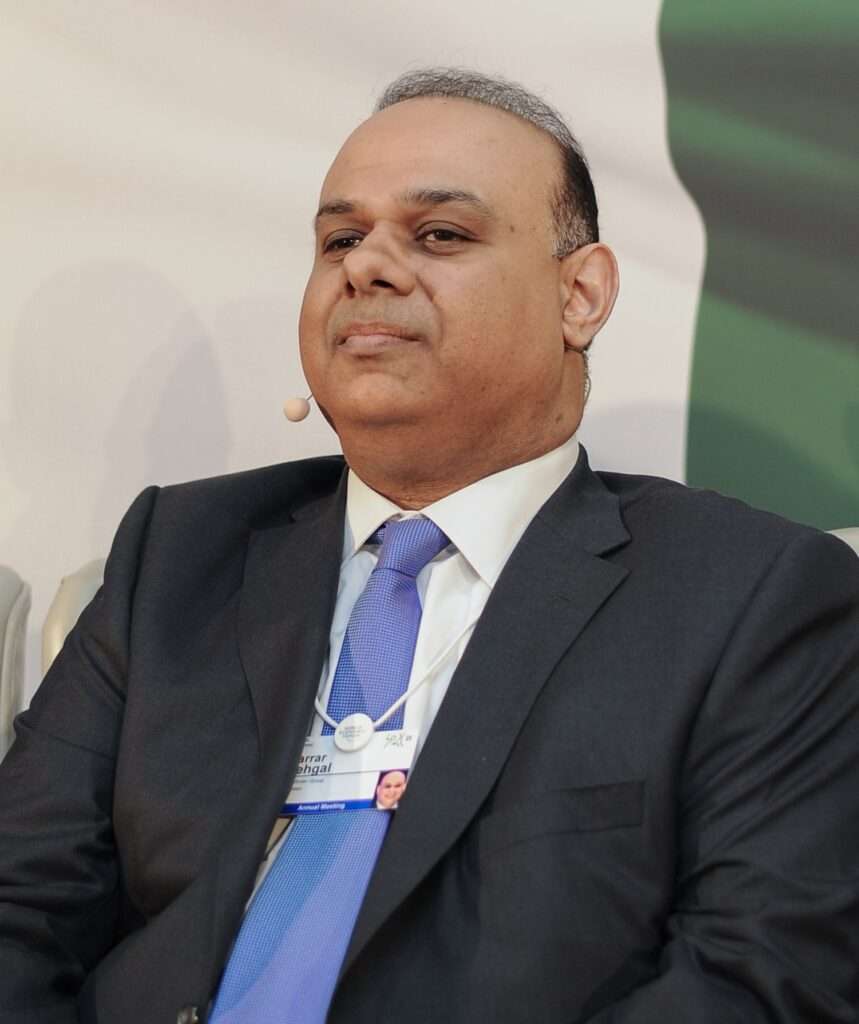
Zarrar Sehgal, Chairman – Pathfinder Group
Thank you very much on behalf of the Pathfinder group and UBank, we’re delighted to welcome you to the Pakistan Breakfast of our annual event at Davos, and on behalf of the World Economic Forum, Mirek Dušek is over here. I would like to wish a warm welcome to all of the panel members who I will introduce, but in obviously particularly our Chief Guest, Senator Sherry Rehman, Federal Minister of Climate Change in Pakistan, a critical topic of discussion not just in Pakistan, but the world over. I’d like to welcome all our distinguished guests, family, friends, it’s wonderful to see everybody on this bright morning, hopefully everybody’s had their coffee, it’s good to see you, and I would like to start by letting Mirek say a few words on behalf of the World Economic Forum, he can also explain to us what words like poly-crisis means because I looked it up in the dictionary there’s nothing like it, but since the Swiss keep inventing English words I’ll let you start.
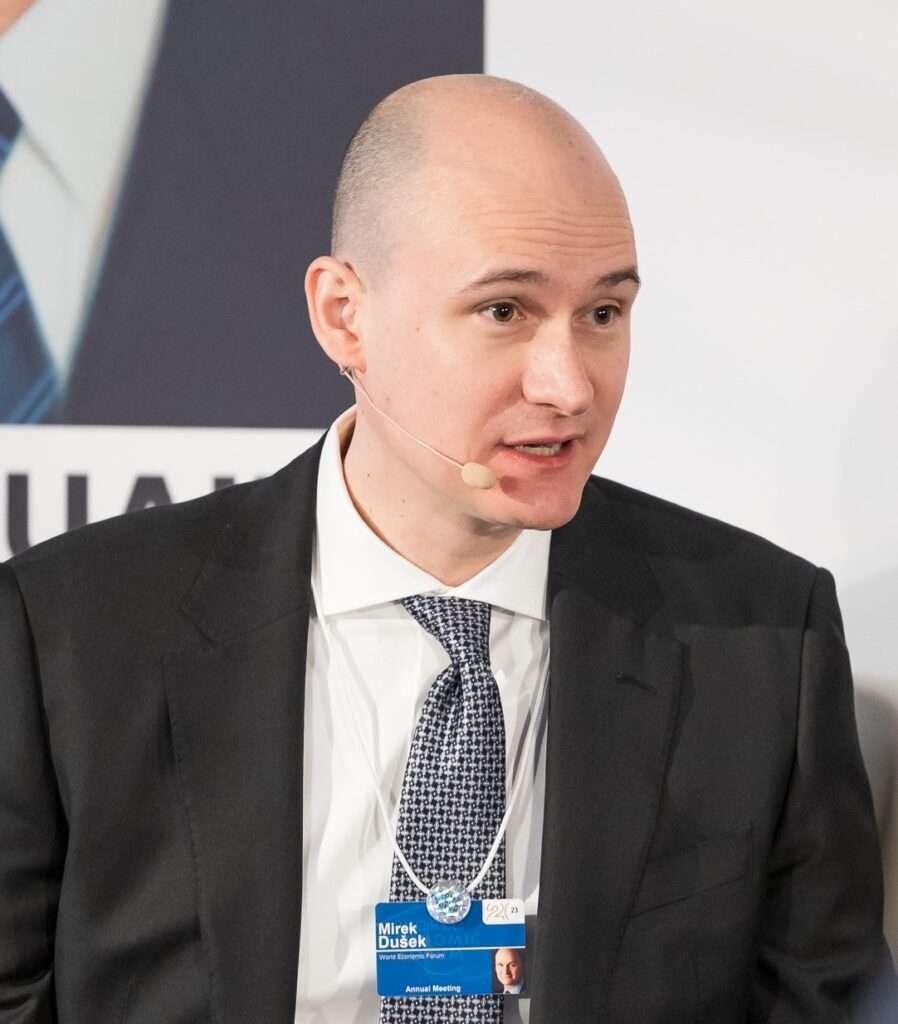
Managing Director, World Economic Forum, Mr. Mirek Dusek
Your Excellencies, ladies and gentlemen, first I’d like to thank our host Ikram Sehgal for convening this distinguished gathering year after year. I remember being here a few times already and it’s always such a pleasure, so thank you so much. I’m deeply proud of our partnership with the Pathfinder Group and our friendship with you, Ikram, and the work that you do to strengthen the ties between Pakistan and the Forum, but also between Pakistan and the world.
The global crises of the past year have particularly affected Pakistan. Inflation, the fallout of the war in Ukraine and unprecedented summer floods, have conspired to slow Pakistan’s post-Covid economic recovery. From 6% percent growth in 2022 to the 3.5% that is projected for 2023, Pakistan is facing a challenging year; however, there have been considerable efforts by the government to secure funding for post flood reconstruction including through a UN conference in Geneva, just last week, and Pakistan has emerged as a global champion for climate change loss and damage fund to help countries like Pakistan that are disproportionately affected by our changing climate.
The Forum is committed to helping Pakistan showcase its achievements and deliver impact for its people. We have done this by bringing together leaders from business, government, international organizations and civil society for over 50 years. Stakeholders have been working with the Forum as a platform to scale up their own projects, and to amplify the impact beyond the region. There are five centers, focused on new economy and society, nature and climate, industry transformation, industrial revolution, regional and global cooperation through their interconnected initiatives; they help our partners drive impact in an increasingly complex global landscape.
Our Global Lighthouse network is redefining processes and environmental sustainability in factories around the world, The Edison Alliance is improving one billion lives through digital solutions in health, finance and education; we are honored that Pathfinder group, through the Asaan Mobile scheme is now part of the alliance, and we look forward to working with them and other stakeholders in making Pakistan one of the lighthouse countries for financial inclusion.
The Forum is also working with over 350 organizations to provide 1 billion people with better education, skills and economic opportunities. To this effect, we had launched closing the skills gap accelerator in Pakistan in 2019. The accelerator, ‘Parwaz’, is currently working across three key areas and has identified eight priority sectors. Through Pakistan’s Ministry of Climate Change, we also work together to reduce plastic waste as part of the Forum’s Global Plastic Action Partnership and we are working on an initiative with the Pakistan Board of Investment and the Saudi-based digital cooperation organization, to launch a digital FDI project in Pakistan. We’re deeply grateful to the Pakistani business community for working hand in hand with us, and also to the government for being such a great partner. We very much look forward to working together, to make the most of the opportunities that are open to Pakistan. I wish you a fruitful week here in Davos. Thank you!
Zarrar Sehgal, Chairman – Pathfinder Group
Thank you! Thank you Mirek, and obviously on behalf of the Pathfinder group we look forward to working as part of the Edison Alliance, and we can make Pakistan one of the lighthouse countries of the world, and part of the Edison Alliance. We’ve been doing wonderful work through our Asaan Mobile Account Platform and through VRG in collaborating with the World Economic Forum, and it has yielded wonderful results for the underprivileged in Pakistan, so thank you again!
Zarrar Sehgal, Chairman – Pathfinder Group
My next guest probably needs not much introduction, Ross Perot Jr. I could give you all sorts of accolades about his business and so forth but he’s family, so it’s hard to say too many nice things about him. Our roots run deep, as he was one of the first co-pilots to have co-piloted a helicopter around the world in 1982. He received the gold medal award for excellence from Ronald Reagan in the 1980s as well. He’s been intimately connected with the Fort Worth Alliance, network and the airport, and the inland ports and so forth. He has dabbled in many sports if that is true, more importantly he has now invested in a cricket team so, we are very grateful for his deep interest in cricket; but the ties between him and my father Ikram Sehgal, run very deep. They’re both aviation pilots. My father obviously served Pakistan Army as an aviation pilot, and they obviously grew very fond of each other as part of that. They flew helicopters together as well and I think that that bond has only grown deeper, so without much further ado, Mr. Perot.
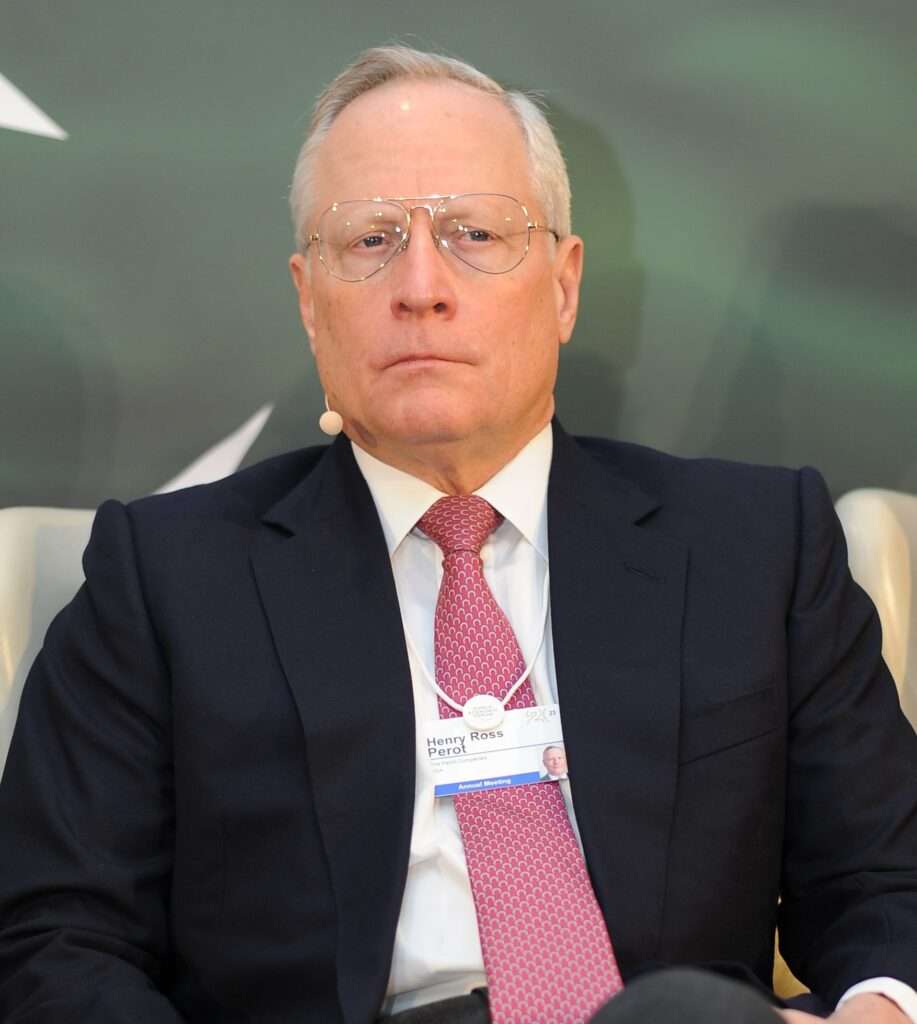
Ross Perot Jr. Chairman – Perot Companies USA
Thank you Ikram and thank you for this honor to come to your breakfast. 15 years, I’ve been here at this breakfast and I do feel like family and you and we have done a lot together in the world and we have been part of the East West Institute, so for years we organized the back channel track 2 work around the world. we had really good success. I think you’re going to need a little track-2 right now. We need to help glue our world back together again, but if you, and also, I’d like to remind everybody at this breakfast that, Ikram is a very good pilot. He came to Texas, hadn’t flown for decades. I put him in the helicopter and said OK, here is your aircraft and he didn’t miss a beat, so he’s got very good hands. He’s a natural pilot and so we had a great day flying around again together, but if you look at the world today, we have a world filled with challenges, and we know those challenges.
We know one more time the human race will have to adapt and we will have to overcome these challenges that we’re currently facing. I mean you look at the history of mankind, we will work our way through these issues and certainly the Ukrainian war has had a major impact on Europe and that’s one war that is going to go on a long time. I don’t see any quick resolution to that and it’s the resolve of the western world and resolve of the American people. We are with the Ukrainian people and will continue to help the Ukrainian people in this battle and so I think it will take a while for that to resolve, it disrupts energy flows around the world and we’ve seen the disruption of energy. It’s disrupted food supplies around the world and we’ve seen that we’ve also seen amazing ability for the Europeans to adapt and how quickly the Germans were able to bring in LNG to backfill the Russian gas and within a matter of six to seven months, they had the terminals up and built so it shows what happens if you have that resolve, you can fix this problem and many of the times, at least in our country, it’s the self-imposed rules and regulations, we put on top of ourselves slow us down so much, that when you allow the people to go to work they can go to work and they can get things done.
If you look at the United States, our economy will have probably a marginal year from an economic standpoint. We’ve had two very good years from economic growth, if you look at the amount of money going into the system, the markets were good and now last year was bad. As you start to pull our Federal Reserve money out, you start to see a correction in the interest rates when we had free money in our country.
I read an article in the Financial Times that says that it was the first time in human history money has been this low and so you have that much cheap money floating around in our country. We made lots of mistakes, a lot of bad investments and that came home to root last year in the stock markets. This year the mark, the rates will go up to 5% to 5.25%, the markets will probably still be a little bit marginal for the first half of the year. Once the rate slowed down the markets will start to come back a little bit but you’re seeing in our country, very low employment and we have a system where too many of the American people are not working and so we’re going to have to encourage the American people to go back to work. A lot of it has to do with our entitlements, right now in our country if you don’t work, a family can pick up about 60,000 a year and since like that you’re being paid not to work. Those are the entitlements that went in, we pull that out and we should see the economy start to come back and then relationships with Pakistan. Ikram and I talk about this all the time, we talked about it this morning, the U.S-Pakistan relationship needs to get back to where it was. We need to strengthen those bridges together. Our countries are too important to each other, our ties have been very deep, especially our military ties were deep for decades. We need to rebuild those ties and continue that partnership, because the more we get along, the closer our militaries are, our military is a lot of people – if you haven’t been in the military you don’t realize – one of the greatest diplomatic forces we have is our militaries and our militaries can resolve many problems backstage before they become a problem in actual, open conflict between nations, so those military ties are very important. We hope we can continue to do that but thank you.
Zarrar Sehgal, Chairman – Pathfinder Group
And we are obviously very grateful for your support over the years and through the East West Institute as well, I think we had a very fruitful collaboration through a lot of back channels in Pakistan, a lot of issues got resolved that people are unaware of, that got resolved through those back channels so very grateful for your support for Pakistan. You’ve always been a friend of Pakistan and we appreciate that.
Our co-host next, Kabeer, President and CEO of Microfinance Bank, UBank. UBank and Kabeer have been at the forefront, I would say, of some of the innovations in microfinance in Pakistan and literally the world over. There are countries of the world that have been imitating what Kabeer and his team have done at UBank. We are very grateful for you, co-hosting this event with us, if you’d like to say a few words.
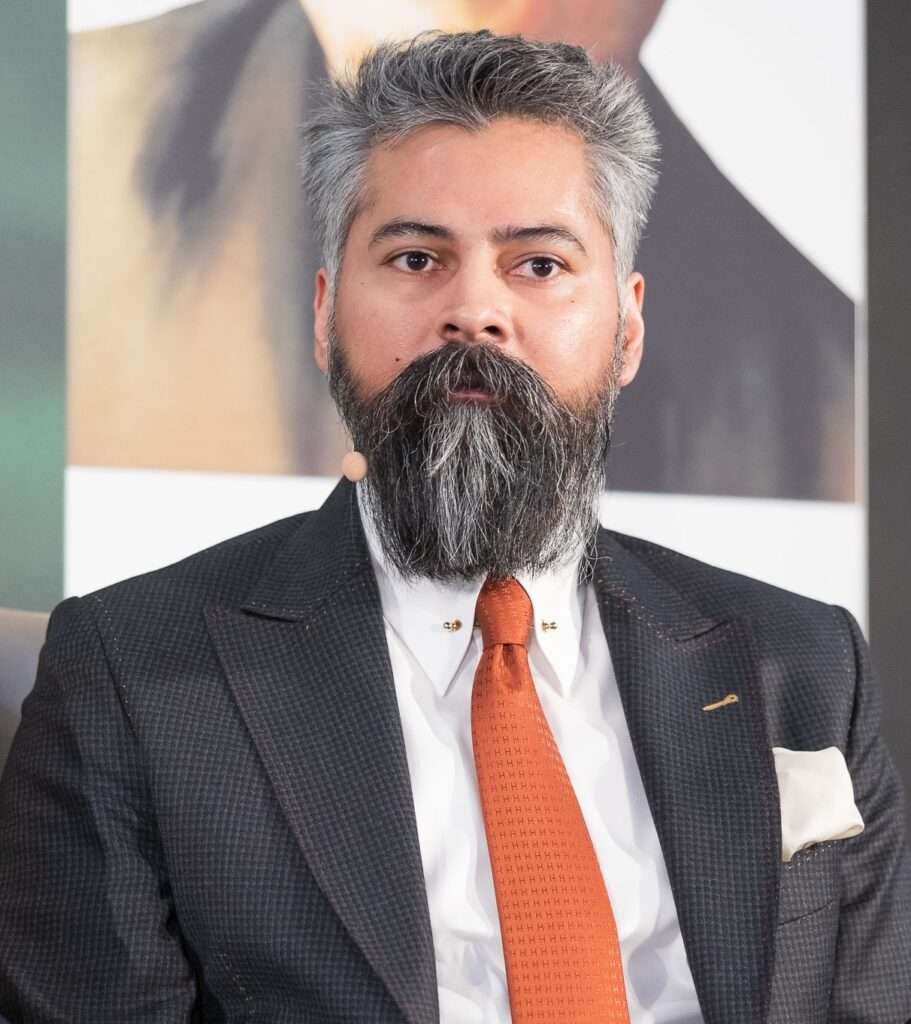
Kabeer Naqvi, President & CEO – U Microfinance Bank Ltd.
Thank you for a very elaborate introduction, you’re extremely kind, thank you Ikram Sahab. I welcome you all here on behalf of Pathfinder Group and UBank. We are the co-host as Zarrar mentioned today. This is my fourth time here and Ikram Sahab and I have been talking about many things. At the center of it has been inclusion; financial and social inclusion, so I’ll talk a bit about UBank and what we’ve done and then I’ll move to the Pakistani context as what is needed, and how we are partnering. I’ll talk about potential partnership coming up between the Pathfinder group and UBank for poverty alleviation. UBank is a microfinance bank as Zarrar mentioned, we are one of the 12 microfinance banks in Pakistan. We are the fastest growing, I take pride in saying teams have worked very hard for this last seven years. We are the largest in terms of brick-and-mortar presence in the country, and growing.
The bank is owned by the national telecom PTCL, which is in turn owned by Etisalat, which is a UAE based Telecom Group along with the government of Pakistan so as we are a mission-driven bank, what is closest to our heart is financial inclusion and what we have learned over the years is that, without social inclusion there is no financial inclusion. Pakistan is a country of 220 million people and 65 percent of the people in Pakistan are less than the age of 34, a hundred million are around the age of 15 or below, so we have a very young budding population that needs education, training, nutrition and so on and so forth. I’ll share the story between Pathfinder Group and UBank. We met about six seven years back when I had recently taken over UBank. It was a small mom-and-pop microfinance bank primarily, found for the purpose of branchless banking with not much interest towards the core financial or social uplift of people. Eventually the shareholders and the management realized that the real work that needs to be done with a mission-driven bank is to increase the income levels of an average Pakistani, that coincides very well with the AMA account that was mentioned earlier by Mirek as well. I’ll take liberty of talking a bit about the AMA account. We all know, I think about mobile wallets all over the world and this is something which is increasing in Pakistan. The State Bank took a very brave decision for taking out a branchless banking regulation which was bank-led, unlike other parts of the world where it was Telco led and with bank-led branchless banking, taking banking out of the brick and mortar to a small superstore around the street.
The compliance requirements the KYC, AML became very complicated, so Pakistan takes a lot of pride that in the last 14 years we’ve been the first movers in terms of branchless banking, outside as a bank-led model and I want to mention that a Telecom Group acquired a microfinance bank which was not a coincidence, because if you see the ticket sizes when you talk about the masses, the local remittances are about 4,700 Rupees, ticket size still that’s what’s happening at AMA as well as the proprietary accounts that we have, UPaisa, then we’ve got JazzCash, EasyPaisa and multiple other good brands in Pakistan. We are covering about 50 million people in Pakistan in terms of penetration of mobile wallets. Now, the next step is the real challenge to give products to people where their income levels can actually increase. Payments is usually misconstrued for branchless banking, payments is a fraction, i.e. to get things going, the real test will be if we are able to provide credit to the average Pakistani based on digital channels, based on income proxies which is very hard in terms of management of risk because that will require banks to put in their capital at risk the way they’ve never put before. The partnership between Pathfinder and UBank, I’ll talk a bit about that, is that accounts are Telco agnostic and Bank agnostic, that’s the first one in the world that’s why I think we have been considered for a lighthouse country in terms of penetration in the market.
What that means is that all banks and all telecoms in Pakistan can come on to this platform, we’ve got about seven million accounts Ma’sha’Allah and increasing, so what we’ve done is we have made AMA account our default account so any client walking into the bank for a credit or loan of or saving account will by default be given an AMA account and will be on the platform. The bigger challenge is now to get on to the credit business which is the crown jewel if you ask me. Because provision of credit is something that financial institutions the world over have been shying away from as consumer credit, we know the risk is higher, retail, yes but you’ll be surprised to hear when you talk about that strata or part of the society, landless farmers, subsistence farmers, their repayment behavior or a small retailer is amazing. So the microfinance industry in Pakistan has been holding the delinquencies at less than four percent over the last 20 – 22 years, if I exclude the acts of God like the Covid, the recent floods, or locust problems, the repayment behavior is excellent. Because the loans are used for productive purposes and are not consumed and we have seen some very interesting inspiring stories where people have come in for a loan say of 50,000 Rupees and in the fourth cycle or fifth cycle, they’re borrowing up to a million or 2 million rupees. About UBank, just to give you an idea about scale in Pakistan, this is where I’ll close and I’ll leave you with this thought that this bank had total assets of 2 billion rupees seven years back, organically, we are now 221 billion rupees which is close to a billion dollars in total assets. Local talent, local strategy, local scale and we are growing. So Pakistan is a great destination for investment where there’s a lot of opportunity with a young population and a huge teledensity. 170 million people are hooked on to mobile phones but less than 20 percent have banking penetration and that’s where we come in, so I welcome you all once again and I’m open to discussions later in the day.
Zarrar Sehgal, Chairman – Pathfinder Group
Thank you Kabeer and obviously from my side, I remain truly impressed by what UBank has achieved. I know you’re being humble and not discussing your own role in it, but I think you’ve been a critical part of that growth. Thank you everybody for your patience. I’d like to obviously now go to our Chief Guest, I could do a long introduction with all the portfolios you’ve held and so forth but our Federal Minister for Climate Change Senator Sherry Rehman is the pivotal person in Pakistan today with what Pakistan is facing, with what happened with the devastating floods between June and October of last year and the effects of which are still being felt today and will be felt for many years. The Minister has been tireless in her efforts from going forum to forum, from country to country, to raise not just awareness but bring real funds for Pakistan and in the recent Geneva Conference that took place your success was very apparent.
Just a little bit of history if you don’t mind, you’ve obviously served as Federal Minister before in a previous government, you were Federal Minister for Information and Broadcasting, founder of the Jinnah Institute, one of the most influential media figures over many years, you also chaired which I believe is the first Counter-terrorism Task Force many years ago, dealing with among other things cross-border insurgencies and so forth. You have been the Leader of the Opposition in the Senate, now you are part of the government and obviously as Federal Minister for Climate Change you’ll be leading our efforts. Recently the Financial Times included you in the 25 most influential women in the world. I would put you in the top ten personally but they have a list of 25 so we’ll go with that. You’ve received the highest civilian honor in Pakistan in prior years. Please, the floor is all yours, thank you again! We’re very grateful that you could make it. Thank you.
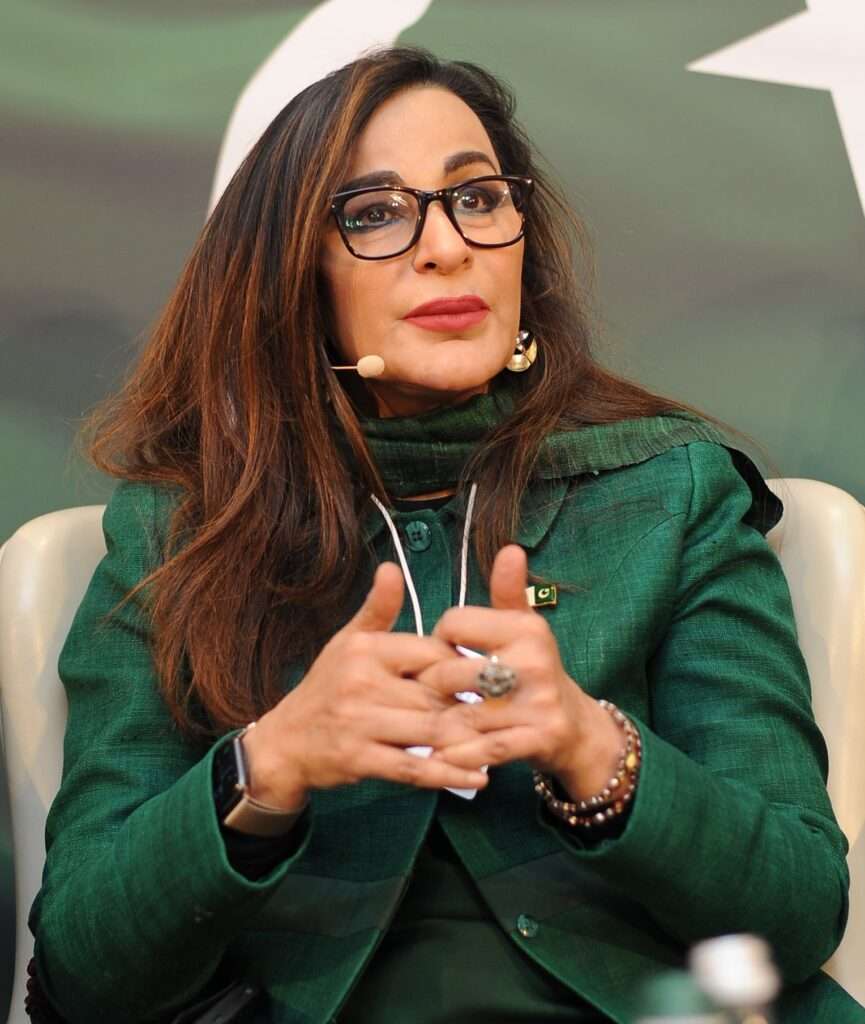
Sherry Rehman, Federal Minister – Climate Change in Pakistan
Thank you very much for that generous introduction but before I begin, I’d like to pay a small debt of gratitude to the Sehgal Group family and the Pathfinder group, friends of Pathfinder, UBank who’s had a long say here today about inclusion and I think it’s very important. I live with that; my husband does the same business and it is really gratifying to see year after year a Pakistani event with regularity and to me it becomes the hub of great many opportunities for Pakistan and I really appreciate Mr. Sehgal.
Ikram has been an old friend, I don’t know where that journey began, I’ve lost track of it, but it is something that basically based on our intellectual interests and he has them too other than business ones. We go back a long way, and I really find the Pathfinder Group’s commitment to Pakistan as true patriots against all odds and I’m sure every year there are odds and every government gives you challenges but here we are, and this is a wonderful convening, I really am grateful to Ikram and your whole family for championing Pakistan year after year; so it’s a great honor and privilege for me to be here. I’ve been here before, of course, and I’m quickly going to go into the poly crisis that was talked about here. That is a new word, you won’t find it in the dictionary, because it is the defining crisis of this decade, I won’t even say the 21st century, and for us, for Pakistan poly crisis is the word. Why I say that is because there are multiple challenges where countries facing cost of living crises, countries facing other challenges including risks from climate, risks from energy deficits. These three can actually redefine an entire country and population’s experience as they navigate a very difficult decade.
Now I could discuss the century, but I think this decade is decisive for us and it’s also a dangerous decade. Why I say this is because there’s been very little realization the world over, there are still denialists and this is not endemic to Pakistan, but climate change as a reality, or something that will actually inhibit your daily experiences; one day it will inhibit the way you take a shower, one day it will inhibit how a business faces challenges in making its investment portfolios roll out. It impacts the vulnerable disproportionately the world over, and in Pakistan we saw women and children at the front line of this crisis. We in every sense of the word were the ground zero of climate change calamity in 2022. It was a real eye-opener, a record-breaking climate event of the century.
The UN Secretary General visited us and made a long journey to the heart of the flood-affected areas and he was stunned, because that’s what the UN does. They go everywhere where crisis erupts, they try to bring the power and resolve of multilateralism especially the humanitarian relief crisis that we are facing, so we are very grateful. I mean, Antonio Guterres has played a stellar role. He has been a personal advocate for Pakistan and we cannot thank him enough; so here’s the power of the UN manifesting itself for the moral imperative it brought, and the purpose it brought. The clarity of moral purpose that he brought to the project is actually unprecedented to us in Pakistan, in several interactions. He was instrumental in co-hosting with Pakistan the Geneva Conference which actually exceeded the targets that we had set ourselves modestly thinking there’s donor fatigue, there’s other crises in the world. I think we did well there, we obviously did well at COP27 but that’s a long gestation project of loss and damage that we worked on. Having said that, it took every ounce of stamina and literally 18 hour days that went into nights which went into mornings in negotiations, so it was a team effort from Pakistan, it jelled well. I think we showed real leadership including the Foreign Minister, the Prime Minister, everyone was wholly committed. I think that it gives us a sense of how successes can be achieved in times of extreme adversity and in times of what was a climate emergency, and there’s still a climate emergency in Pakistan. I won’t mince my words. What’s going on is something that I think people have lost sight of outside Pakistan.
There are obviously enclaves of huge stability everywhere in the world, but there is a sense of disasters and to stay focused as long as the media is there. That is just the nature of the changing world and the beast that we call commercial media, and that’s how it’s been. The international media was actually stellar in bringing their resources on the ground. They still visit, but let me give you a quick rundown on why I’m saying record-breaking because it impacted 33 million people in one go. 33 million is the size of three small and medium-sized European countries, and make no mistake it’s not over, 20 million are still affected which Antonio Guterres very aptly said at Geneva, three times the size of his country, Portugal. 8 million are still living near water, why – because resettlement is difficult as half of the area that was underwater is not draining out.
Sea level has risen, we are again on slow onset climate impact but we are in a clear arc of vulnerability. I say this because this may happen again. I don’t want it to happen again, we are working very hard to ensure that there is better preparedness, there is adaptation on the ground, we have been focusing on climate. Mitigation means you’re working on reducing your emissions really, which you can never go wrong on, or converting from fossil fuels to renewables, which we are doing and we can talk about that path. We’re doing that because we need to reduce our import energy bills, those are very high. The return of a conflict or war in Europe has actually thrust many countries on this arc of vulnerability, into a magnitude of crisis that we really have never seen before.
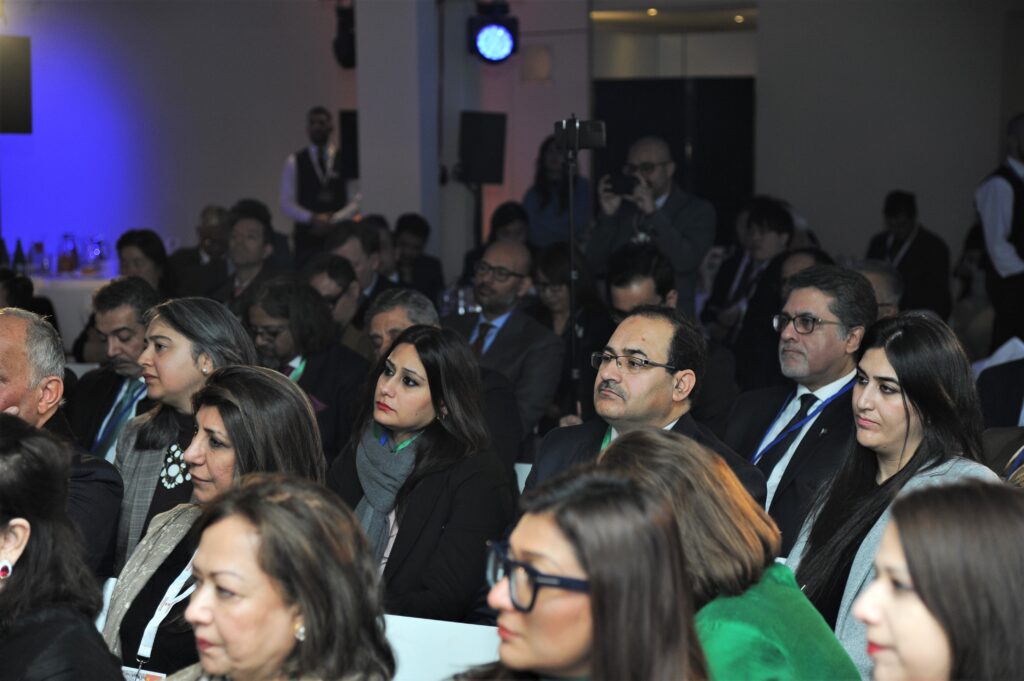
So yes, we are importing wheat, we were a wheat exporting country. We are importing, we even had to import, at some point such a huge LNG and an oil component. The Prime Minister called a cabinet meeting, and said listen we need to reduce our import bill and I said very good we need to reduce emissions anyway, so while we are on the path to renewables, particularly solarization and wind tariffs, we need to make better regulatory frameworks. The core response right now needs to be recovery. I want to thank our development partners, which have been many agencies of the UNDP, UNDP principally and the World Bank, the Asian Development Bank, they really brought commitment to working with us. During an ongoing crisis we had to create a needs assessment, a document which you may have or may not have seen, and the World Bank was very instrumental in assisting us as whether you were the UN Agencies – the World Food Program by the way is still on the ground – as is UNICEF, trying to protect children from a very difficult winter, and winter is very much upon us in Pakistan. It’s no longer only temperature – there are extreme weathers going on so areas that have never seen a high heat or high winter are now experiencing this weather that they’re not prepared for, so we have a very difficult task cut out. All those young people I see in the room who want to work on climate, I invite them to please come to Pakistan, I’ll house you at the Ministry where I have housed some people. Yes, the young people are the future and climate action actually is about including people, it’s about including young people who understand the gravity and magnitude and scale of what can be unleashed in the world. Somebody mentioned here, acts of God – these are not acts of God, the pandemic was not an act of God neither was the climate crisis. These are the outcome of prolonged anthropogenic activities. What is anthropogenic? It’s the century of the anthropogene, it’s called the anthropogene – what that means in English, is that these are man-made activities. These are not woman made, incidentally women were closer to nature.
They exploit nature very differently, then they give back. They give back because they’re working with sustainability all the time especially the poorest and the most vulnerable. They know they can only exploit the soil or the water because they’re walking miles to get the water everywhere in the world, Africa will tell you that too; so we have these man-made crises, even the pandemic. There was a conference on biodiversity in Montreal a month ago. Everybody knows that the species extinction is leading to zoonotic illnesses and disease, returning old diseases that humanity thought they had dealt with. I mean even Pakistan is seeing diphtheria, it had gone and all diseases that Pakistan had dealt and new ones are surfacing that the human race is grappling with. With a future that is inherently becoming more and more unpredictable not just for Pakistan, but for everyone so, managing unpredictability is essential for resilient economies, people and countries. For that I think why were we at Geneva, why are we at COP and Davos because this has to go beyond the United Nations mandate, it is actually the Secretary General wielding his power to the maximum right, but it is made up of donor countries. It’s a sum eventually, it’s more than the sum of its parts, but it is leading global actors that must come together and start finding a realistic path to problems now.
I was at an emissions curve session yesterday and businesses were talking about innovation and leapfrogging and technology that will help those that haven’t really got huge manufacturing industrial bases to move forward with the use of technology, and of course technology is instrumental in providing opportunities both for inclusion and leapfrogging solutions, Clean Energy Solutions, but what do countries do in the meantime because everybody’s talking in silos. Businesses talk in silos at the end of the day. They don’t have an overarching platform where they build best practices that countries can mimic, where they build systems that are not restricted by patterns like the vaccine crisis you heard of. There was a great deal of inherent inequality built into the vaccine distribution, it was discussed at many forums and now inequality has been amplified to a quantum degree by climate stress. I say quantum, because it has gone off the charts. 33 million impacted over a month or six weeks, is a shock to the system of any country. It is a risk no one could have anticipated.
For instance, we have floods in Pakistan, we had something called the big super flood. the entire world turned up, the American Choppers were flying, everybody was there, everybody was their relief and rescue. Just for perspective that impacted 20 million this was much bigger. 33 is a conservative figure right, and while people rose to the occasion, the international community also, everybody seemed overstretched. There was maximum overstretch, and I missed – out of fear of Ikram – I missed a risk Advisory Board Meeting at the WEF this morning which identified 10 risks to the world and for every country cost of living was the top of the list. Actually, cost of living is a symptom of structural crises, and the structural crises hitting the planet, hitting the way you will experience your tomorrow and even today, in many countries is defined by all of us not taking climate action together because, it is not possible to solve climate issues alone. Why I say that is, Pakistan is a less than 1% emitter so if we go totally renewable tomorrow which we should anyway at one point, we should although oil and the bad old fossil fuels still carry base load in many countries, and coal is returning to the heart of Europe at the hint of a first shortage and I won’t say which countries, but it’s happening. So you really don’t lecture me on the use of fossil fuels for everybody’s leapfrogging development, because we are silently not doing what we need to do, and by we, I don’t mean Pakistan, Pakistan is hurtling towards and we have to hurtle towards the recovery framework we created while we were in this emergency,. That’s called, the Resilient Recovery, Reconstruction framework. I wanted to play a video, my bad that I thought of this morning and we couldn’t get the stuff organized, that showed you the scale and magnitude and ferocity of the crisis. The 2010 floods again was nothing compared to this.
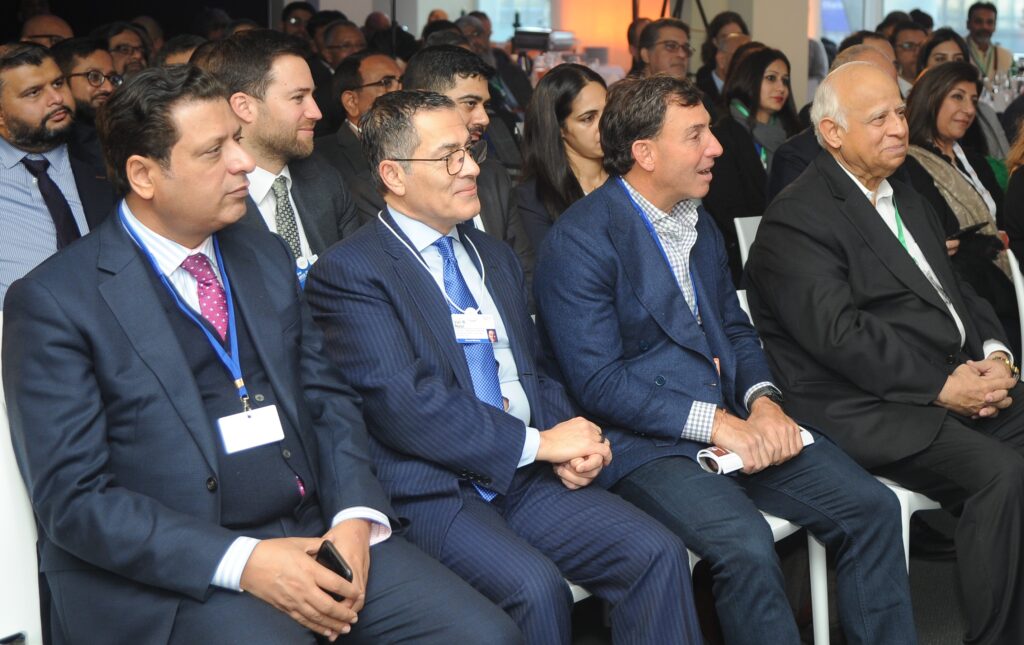
This combined with our glacial melt, we have the largest amount of glaciers outside the polar region, people may not know that but we also have at the same time in the same country, a Delta region that is often in drought, which is right now inundated by water, so one third of the country was inundated, one-third, and we had the glacial melt accelerate to 300 degrees this year because of global warming. Now Pakistan is not causing the global warming, we are too small an emitter and if we go totally renewable tomorrow, totally green, warming will still come to Pakistan. These are the geographies of vulnerability. The longitudes of what I call human suffering. The accelerated impacts of climate stress, and that includes a prolonged crisis now in the Horn of Africa. You see Somalia not having seen any rain and children are starving but the human race in its addiction to consumerism, and waste, has decided to build.
You cannot ignore the crisis and my slogan was: what goes on in Pakistan, will not stay in Pakistan, eventually it will come to the colder climates; it’s salubrious climate but it will come here. Europe experienced 40 degrees temperatures, what did we experience this year 53.6 degrees in parts of Sindh. Now that is not fit for human habitation. Agriculture, which is the oldest activity before the Iron Age, that created civilizations or any other activity, construction, anything. So when you face 53 degrees in the summer three years running, you get forest fires, we lost 17,000 hectares of very precious forests in Balochistan, Khyber Pakhtunkhwa not so much in the Margallas and we actually then went straight into this horror because we were seeing the glaciers melting very fast. They were coming down in torrents and the fury of the water was so great that huge bridges built after 2010, built at a good height in Khyber Pakhtunkhwa were torn apart like toothpicks. Huge Bridges, just giving away like toothpicks, so that was not the fury of God, that was the fury of nature, that we have, as Antonio Guterres very aptly says, we have fought a war against nature for years, the human race by, over consuming, over extracting and imagining that the Earth’s resources are infinite; they are not. We are inundated, by 2025 we face water scarcity that’s how climatic extremes work, so this is a very serious poly crisis we are facing. Why I say poly-crisis because there’s a cost of living crisis, inflation is high, energy is in in short supply and obviously energy still powers everyone’s economies, homes, phones, everything, so these are moments of egregious crisis for the world leadership.
You need to form platforms that ensure scale, responses to scale. People bring little projects, some donors bring projects, and they tick them off. It’s doing nothing for me, it’s ticking your box but it’s not really giving me the scale I need to for transformation on the ground, and that’s what’s needed, transformation in the ground. I asked the World Economic Forum to build that platform. You have the convening power, you have the heft, you have the money and in this arc of privilege, where we sit and talk about scale, solutions, people have to come through for each other for a joint future, for us to find common purpose on saving what is left of the planet. Why are you even bothering to go to war I say, when there will be nothing to fight over after a while, so these are fundamental shifts I’m talking about, they’re existential. Their impacts have come to Pakistan and if we don’t even think or talk about why, then we are derelict in our duties and responsibilities, so while I wanted to talk about the 4RF framework, it’s actually been a great success in attracting portfolio investment and programs and projects that we have designed for recovery now. It still leaves countries like Pakistan on the front line of climate crisis in what I call a recovery trap. It’s not designed for a post-second World War response, it did well for that and now it’s failing the rest of the world.
It’s failing the rest of the world and there are populations where countries are in debt, external debt. It goes without saying that we need to manage structural reform better but you can only rebuild if you’re not inundated. I mean we have new lakes that will never go away. Thousand-kilometer lakes that will not go away in Sindh. Happy to take any one of you there, so topography is transformed, agriculture wiped, and we have faith so we are focusing on rebuilding our bridges over. I think 400 bridges were just ripped apart and the roads, how many kilometers, 8,000 kilometers of metal roads just gone. Our railway tracks are gone, I wish I had brought that very powerful video to show you, how the country – one third of the country was broken. We are working very hard at the recovery and reconstruction. Now if our project plans were not good enough, there was not enough transparency built into it. There wasn’t enough for due diligence built into it then, none of the countries, the bilaterals as well as the multilaterals that came up with the 9 point something billion dollars at Geneva.
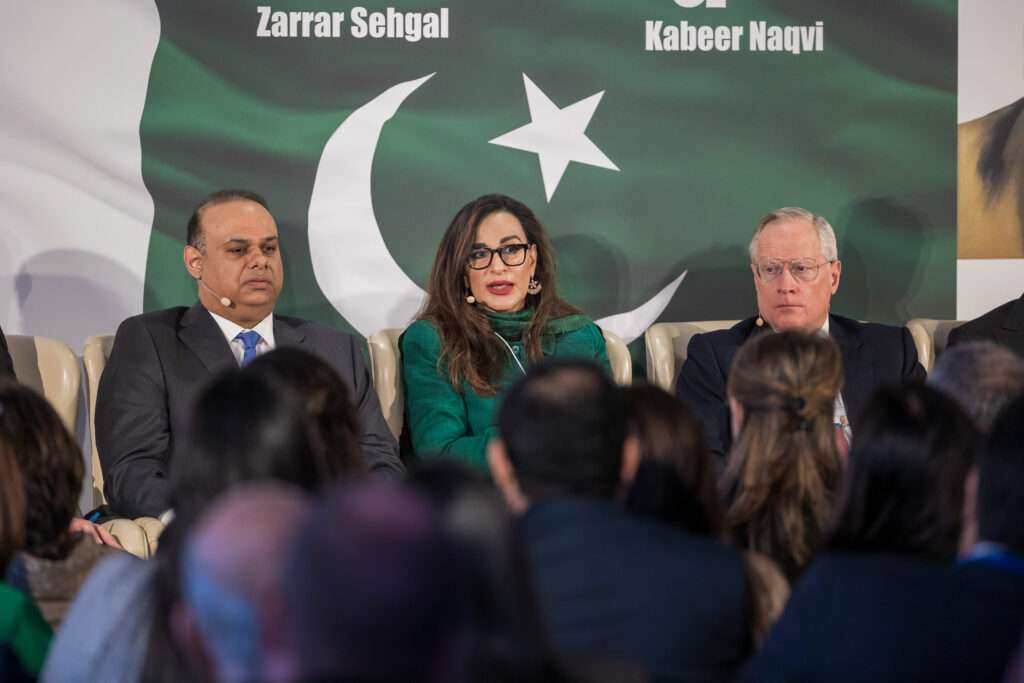
They just kept on pledging because we were showcasing our plan. It was a very pleasant surprise and the UN actually said that this is a new model, Pakistan has formed a new model of recovery, in that; we are not focusing on just the humanitarian response which is still by the way, in need of all your help. Pakistanis are very philanthropic people, it is a documented fact and those with little actually come forth to help those with even less, but livelihoods are wiped out. Poverty has obviously gone up. Farm to market roads don’t exist in half the country, Sindh which is half the granary of the country. The good news is, we still have the largest irrigation, man-made irrigation system in the world intact, but that’s in the plains of the Punjab. The world doesn’t know how will we grow crops, they give us solutions that only work in temperate climates. You give us drip irrigation half the time but the water just dries up at 53 degrees, you can’t cultivate, it’s got to have the good old-fashioned water but you saw it’s a circularity of crisis, yet there is hope. Wherever there is darkness, we innovate, we put our shoulders to the wheel, and we cannot give up, in the challenges, we find opportunity; and that opportunity is to rebuild better.
Not just a bumper sticker, build back better, but actually do it with coherent plans that strategically intervene through the provinces and we will. We’re setting up a recovery unit that the federal government will manage because the donors also come through us, so that is how we are working this. My only fear is reconstruction takes a while. A thousand kilometers of metal roads, all those bridges, the dams, the small dams that were reservoirs, that you build small reservoirs to save water. They filled up with the deluge from the sky, nobody had ever seen a monsoon like this; so while we planned for riverine floods and Glacial Lake Outburst Floods, because in the north we know this happens every summer. Every single summer, we are able to save lives but we are not able to save infrastructure. Hydro power stations, bridges happen when the glaciers melt fast, and these lakes burst, the icy lakes burst, they bring boulders in their way and everything is wiped out. We are able to move the communities in what is known as the Glacial Lake Outburst Flood program which we work with the UNDP.
It’s actually not very tech intensive, it involves communities, they alert each other, people move out but that’s not sustainable as they’re moving every summer, and that’s where we are today. So the poly crisis, is this global warming has brought home, glacial melt, forest fires and the largest flood, the biblical flood that Pakistan saw decimating one third of the country. We are rebuilding with a hope, towards making sure that the next crisis doesn’t occur, while we’re rebuilding but it will, it will. This is nature’s war now back on us. We in Pakistan are no match for nature’s war. We have been home next door for 20 years to the longest war in history, to over 40 countries coming in there, Vali Nasir knows that, I was working with him in in the United States when this was going on. For 20 years this war went on, 43 countries – the entire NATO alliance, a coalition came in and well we all know where that went and we lost 80,000 people, lost an entire generation of soldiers, of civilians, of children, of women that were victims of terrorism we faced. We’ve taken the brunt of this war next door, and we are in no position to take, we do not want to take on another war we are no match to, nobody is. California is flooding right now, its drought, flooding, drought, flooding, it is no match despite being the richest state in the world with the highest resources, the most innovative, home to high tech, well, it’s facing terrible crisis too. Nothing like what we are facing but this is what I’m saying, what went on in Pakistan will not stay in Pakistan. One ecosystem collapses the next starts collapsing very soon, that is the way nature is, that is the way biodiversity is, that is the way climate is. They are all connected. We have built silos, man-made silos in the world and now and we’ve extracted from the earth without giving back. I swear to God women give back to the Earth, I’ve seen them do it and now we are facing a crisis of addiction to consumerism and obviously high use of energy and water – that’s what’s going on in the world today and I believe that’s the first risk everyone faces. Thank you very much!
Zarrar Sehgal, Chairman – Pathfinder Group
Thank you for those very thoughtful and sobering words. I neglected to mention your latest book is called Womansplaining, so everybody go out, rush and get a copy please. It’s a wonderful book, I would like to give the audience an opportunity to ask a few questions at this time I know we are short of time but I know people have questions. Wali we would like to give you the first opportunity to speak if you can please, thank you.
Question
Thank you Zarrar, and thank you to the panel and especially to the Minister for those very thoughtful and sobering comments. I have to say, having watched you or, since the flood one of the positive things I see, or heartwarming things I see is the insight, energy and the to-do attitudes, that you’ve brought to this issue and the gains you’ve made for Pakistan. I mean I also have to say that in addition to the very large issues that you raised, of course Pakistan is facing some short-term sets of issues including one that you mentioned, that is the macroeconomic issues but also the elephant in the room in most conversations in the US is the political uncertainty Also, for the kinds of solutions you mentioned, Pakistan needs people to be in charge of that portfolio for prolonged periods of time to oversee something like Pakistan’s Global initiative, etc., so I’m hoping that these things get resolved in a way that will help Pakistan deal with the very big issues that the Minister mentioned.
The one issue that I think is important going forward in addition to the major ones, that were mentioned is the fact that Pakistan for many decades lived in a particular security environment. The war that the Minister mentioned dominated military to military relations, Pakistan was a very important country internationally because of its role in the most important geopolitical issue of the day, but that geopolitical issue is not important anymore in the same way. The war in Afghanistan is over, attention is on China, on Russia and it also behooves Pakistan to sort of reinvent its relations with the world. Of course climate is a very important, one being involved at that level but I think Pakistan needs to find a way to build relations economically with the rest of the world. This has to become a relevant to the larger economic issues. Its relationship with the United States has to be economic. If there is no security concern, then why would people pay attention to Pakistan and a country of 200 plus million with the resources it has. It’s easy to say it’s the job of the government but I actually don’t think so, I think it’s a job of the Pakistani private sector, the one big asset Pakistan has, its vibrant private sector and large middle class and, I think above and beyond all of the crises, it’s important for it to find a way to play the same kind of economic role that many other similarly sized countries, the one next door to Pakistan for instance, is doing, so I’m hopeful that having businessmen here, having them engaged here, having them engaged on the critical issues will bring them out of their silos so they play the role that they need to play for Pakistan.
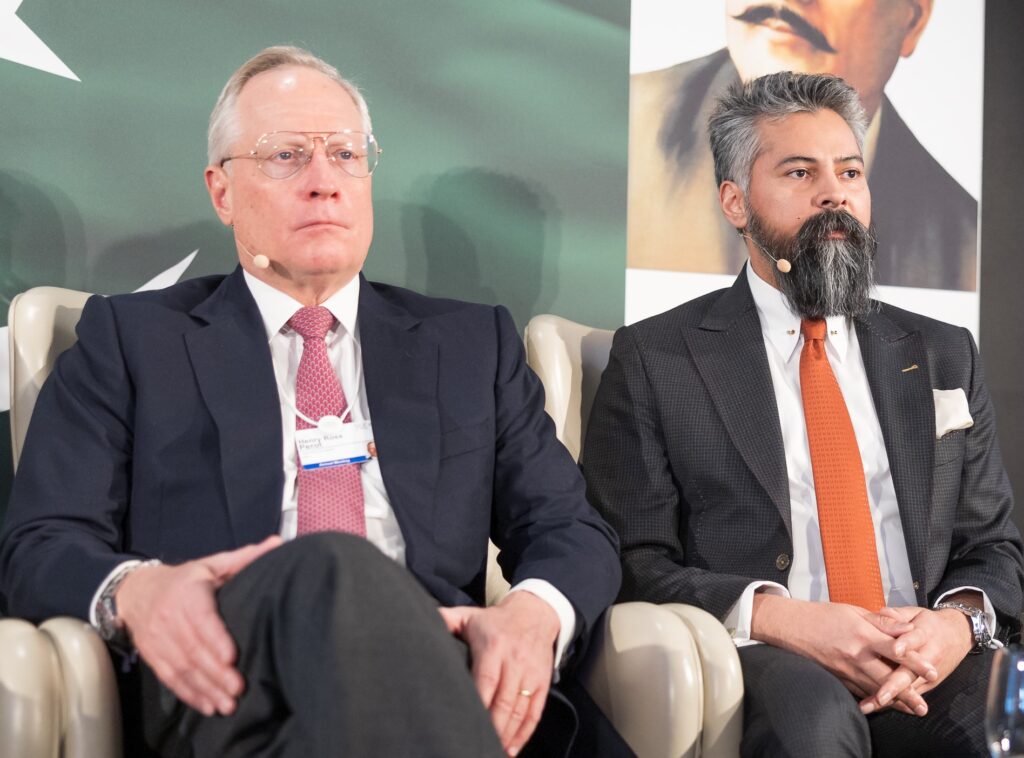
Federal Minister for Climate Change, Ms. Sherry Rehman
I mean it’s a very important point that was brought up. This is a world actually divided in many ways, the polarities at home as well as globally, competition is fine, I think it’s going into conflict now. The creation of the authorization of powers and states and creation of blocs is something that smaller countries, developing countries are now being forced to navigate; so Pakistan’s diplomacy has been quite deft and we have deepened and renewed our ties with the United States. After a bit of an interregnum while also banking and trying to capitalize on the opportunity offered by China in the CPEC momentum.
We now don’t see ourselves as a member of any particular bloc, we’re navigating all the differences that are coming up and really, all the crises that I spoke about, they do need global networking, they need global agreement and consensus, so if you want to reshape your own future, you have to widen the circle, and that circle includes the private sector. The private sector wants predictability for its contractual frameworks, that’s a very basic need that all businesses want. They want stability and they want contractual predictability. I’m not a particular advocate of long-term governments just staying on because that breeds other crises and my views on democracy, Vali, better than me, but I’ll give you an example of how countries can best within the countries and outside work this whole new era of dangerous divisions. Why I say this, because say when we are reconstructing, when we went to Geneva we did not take the province of Sindh which is allied with the government, the federal government we invited repeatedly, all the four provinces which are contesting the federal government. Khyber Pakhtunkhwa sent one, we took there one of the ministers, Balochistan also sent who they could. All four provinces went there. The Foreign Minister chaired the session where they were stumping for their projects. We amplified their asks, we work with them in every disaster, we’re working with them in every recovery plan so while there’s politics raging, partisan politics, deepening polarities at the government level we cannot do what some have done, we have to work as a federation. We have to work with all players and say okay, I’ve got a forest fire meeting I want all the provinces on zoom right now, and they do come on.
We don’t publicly put it on so that everybody feels secure in conversing, but in Geneva, we took them all. We enabled it because reconstruction has to be through the countries. You can’t create silos that are based on – I do not like you and therefore you may not get the benefit of our recovery projects or funding or plans – so I think that’s one of the ways forward. Internationally I would think that global leaders, the big countries, the rich countries where wealth has been generated since the Industrial Revolution; they need to speak to this crisis of polarities that is that is now transforming the world. Transformations bring either opportunities or they deepen existing challenges, and right now we see the decoupling of economies, the protectionism, see The Economist this week, see the big Editorial – it’s anti-globalization, so if we’re making a shift. Stop the strategic drift and our 4RF plan is just walking right away from strategic drift as a governing model but the world is right now in serious strategic drift going into what we thought ended in the 20th century. All sorts of divides and walls going up whereas every crisis that is emerging in the world today from Covid to new diseases to climate crises, to even cyber-crime managing and regulating the digital sector and how digital media is now a force for division very often, that’s being addressed in other important sessions, Nighat that you must be speaking to, how to regulate that. These are new challenges for joint platforms but we see walls coming up so I think the responsibility must lie with the empowered.
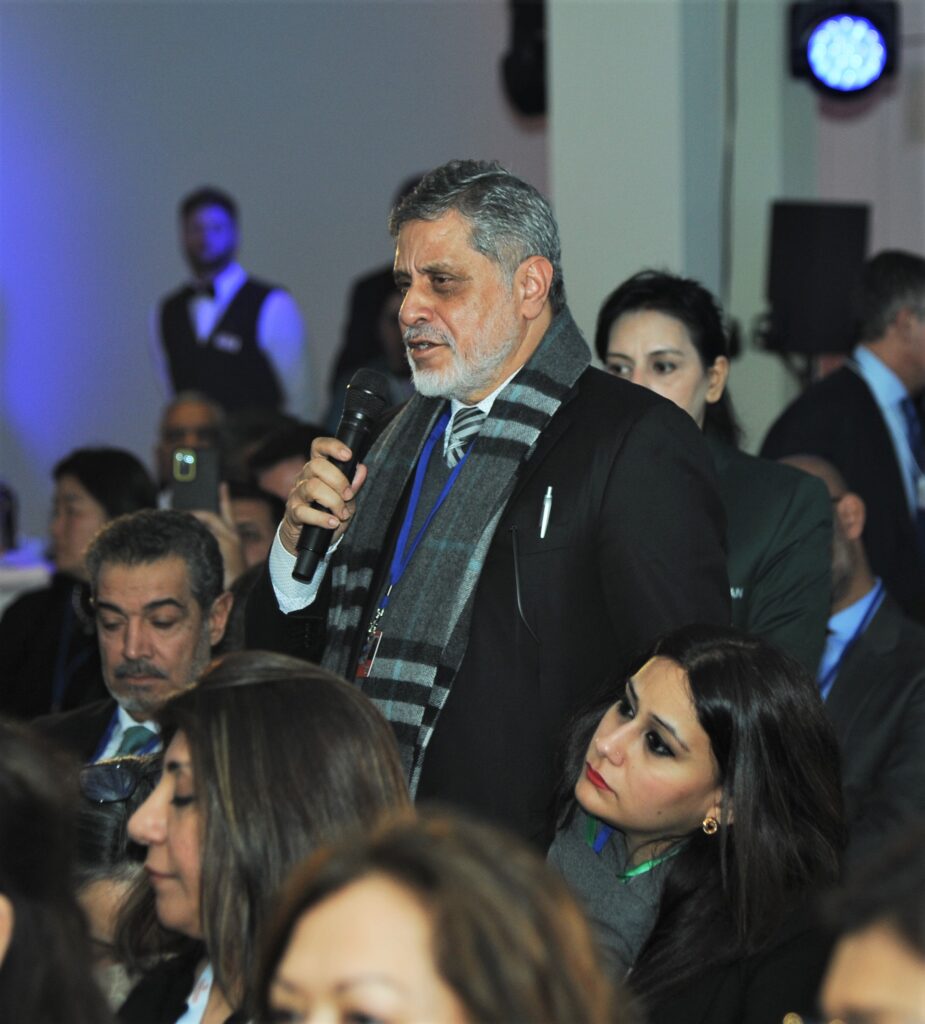
Question
My name is Zubair Tufail from Karachi, my question is to the minister that Pakistan has seen the worst floods in the history of Pakistan, where 33 million people were affected and still the federal government has done a great job with support of United Nations and the Secretary General was kind to come all over Pakistan and then, you had the recent conference in Geneva, where you raised a big amount of funds which is close to about 10 billion dollars, but my question is that still a big number of people are affected in especially in the province of Sindh. They are displaced and still water is there so what how do you foresee that how long it will take the water to go out and when these people will be settled back into their villages? Thank you.
Federal Minister for Climate Change, Ms. Sherry Rehman
Thank you, I really appreciate your question, that’s something I keep raising on media in Pakistan also because humanity is in the business of trying to get through the day, you desensitize yourself to too many stresses and that’s just how one works, but you can’t forget as the forgotten can then become the forsaken, so if we forget that there are eight million people and a high percentage is women and children the UNICEF keeps reminding, so this is a big challenge and the flash appeals we made for just the humanitarian envelope were underfunded, unlike the reconstruction ones. They were over funded because these are projects people are investing in and they see a future here, there is humanitarian fatigue, assistance fatigue that’s what I see in the world because resources are going to other things, to other crises, to energy and supply chains being blocked by the war. There’s a cost of living crisis in the UK for instance, very high in many countries so we are facing donor fatigue here. Pakistan has right now all climate resilience funds everything was repurposed for providing over 65 billion rupees which is over 300 million dollars, a billion rupees and million dollars to other affected households which were triangulated through Benazir Income Support Program. Again this is a gold standard in security for a poverty alleviation all over the world, it’s recognized as a gold standard so we luckily had that. We had those indices working, those were cross-referenced and we have moved that much money to the front line, it is still not enough, you’re quite right many of those lakes will never be drained so the topography of Sindh is transformed. If you go there or just look at my Twitter feed, we went to Khairpur a few weeks ago, it’ll take years and then the soil will not be of the kind where much will grow. We are trying very hard for livelihoods and shelters to be built so that people now move away but human nature is such they want to live next to the riverbed where they are vulnerable and you can’t police migrations, inland migrations so it’s quite a challenge. People just wandering back with their livestock and so one heartbreaking story here is you go there in the height of the humanitarian relief phase. Mosquito nets were needed because of disease emergency, waterborne disease emergency was huge and the WHO was on the ground, still is, but the mosquito nets were being given out, one of them just put it on their buffalo, not on the family because that ensured a future for them, that was their certainty for tomorrow that one buffalo, so we can do a lot. Businesses can actually move mountains. They do in Pakistan, they did in 2010, they’re even doing it now but capacity to service 33 million that’s like three countries of medium-size, surely Pakistan needs your help, yes we’re helping ourselves, but we need your help to further control humanitarian crisis.
Question Well my name is Nighat, and I’m from Pakistan representing Pakistan at Davos as YGL and I work on digital rights but Minister I really want to appreciate the work that you have been doing and pushing the agenda not only in Geneva but also at Davos. I’ve heard you speaking last night, you did a really good job but I have one question to ask, I really appreciate what Pathfinder has been doing for over a decade at Davos and bringing Pakistan forward but I really feel that government hasn’t been doing enough in terms of bringing Pakistanis at Davos. I have been into different sessions speaking on digital transformation technologies from the global perspective also and the perspective from the Pakistan is not there. You are doing amazing job, Minister, Hina is doing an amazing job, but I think we really need to see what government can do and make this a consistent effort at Davos. The question that I want to ask is that we have seen a lot of money has been promised to Pakistan around these crises, how much of this will be translated into action? That’s my question, so thank you so much.
Federal Minister for Climate Change, Ms. Sherry Rehman
Okay Nighat, thank you very much for your powerful advocacy for digital rights. I thought you were going to say we’re not doing much, enough for that because we need to do more and we were discussing actually, just yesterday how we need to enhance that regulation, it needs a redo totally, but that’s a separate issue. The 4RF plan is about rebuilding and reconstruction, it is a flood reconstruction plan, mostly resilience plan. Your question about Pakistanis being here, honey, I can’t bring, we get criticized for the COP delegation. If you see my Twitter feed, in the Senate, they were like 14 people, we were all in working streams. There were eight working streams, we did not and people were working round the clock, we were running a Pakistan Pavilion for the first time that had featured 24 panels through 11 days it’s never been done. We were like a magnet for all climate conversations, sustainable recovery conversations. Literally everyone showed up at our Pavilion and spoke.
We also showcased our plans at the UNFCC, but much of those are funded, you can’t take huge delegations in the middle of a humanitarian and other crises. The Finance Minister could not come, he’s dealing with all sorts of emergencies there and while yeah in short it’d be good and I sense that deficit too but I don’t think that this is about only governments showing up, it’s important for governments to show up, three of us have and we’re completely stretched though the Foreign Ministers, but we took six to Geneva, on that also I had to answer in in Parliament as to how it was funded, I didn’t even take my federal secretary. Look we can’t add this on to public expenditure, this is not the time but I do feel that there needs to be far more active representation from businesses, from civil society, that can headline conversations that are extremely relevant to Pakistan and redefine some of our deficit in the voices that come up here. It becomes a very in-house conversation, I’ve noticed where big businesses and cold climates are talking to each other and basically at the audience so I had to interrupt that last night and I said, look I’ll disrupt this conversation because I have a reality check on all of you, they said this is what we want. There are many more young people and other businesses that can represent Pakistan, now I can’t make WEF invite them. We need to level up our engagement at the non-government sector, also this is not the job only of governments nowhere in the world.
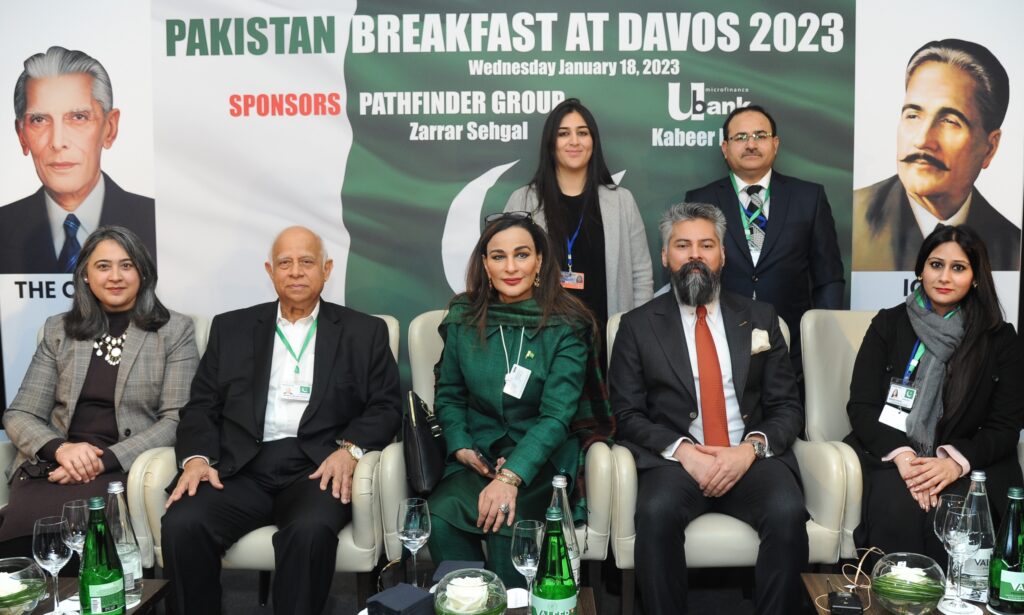
Chairman Pathfinder Group, Mr. Zarrar Sehgal
Thank you! We’ve unfortunately run out of time but this has been a riveting discussion. I would have done a longer conclusion but I’ll keep that short, I wanted to obviously thank our Chief Guest , it was a wonderful discussion. Obviously, I want to thank Kabeer and UBank and Mr. Perot, I’m really grateful Senator for your remarks on my father and how he works tirelessly every year.
We can we can thank him, we can publicly thank him, it is a thankless job. I frankly couldn’t do it, I like being thanked a lot so I come from the generation that requires a lot of appreciation, I would like to also mention a few people like the Dawoods, they’re also been stalwarts here at Davos. They waved the Pakistani flag along with us and have consistently done it. So, thank you very much and thank you for attending as well. Thanks to family members, my wife, Kashmala, my mother, my sisters and aunt. Thanks to the entire Pathfinder Group for putting this together. Look, there’s a lot of doom and gloom about Pakistan I get it. I feel it, we’ve experienced, as the Minister put it well, one of the largest global disasters despite contributing less than one percent to the greenhouse gases, we’ve borne the brunt of the world’s avarice, and greed, and years and years of industrialization and if I may add, years of being dictated to and told off as well. We’ve heard a lot of speeches, I think it is incumbent on the world community both public and private to do more about Pakistan. Where I worry particularly is the schools that were destroyed, and there’s obviously there’s a lot of a lot of despair in Pakistan but the number of schools that have been destroyed. This is after coming out of Covid where the children were already falling behind in education and Pakistan did very well during the Covid crisis to keep kids in school, but this is really the youth of Pakistan, the future of Pakistan and this point in time to have the schools destroyed for them, not being able to go back to school. I think it’s really now the world’s responsibility as well to invest in education, invest in schools, obviously the Pakistani government will do what it can, but it cannot do this alone. It’s more than 15 billion dollars’ worth of damage and that’s a conservative.
Federal Minister for Climate Change, Ms. Sherry Rehman
No, it’s losses, economic losses and 16 billion of damage and the World Bank’s CDR report has said this it’s 30 billion dollars altogether. It’s huge, and 348 billion to survive the decade till 2030. Till 2030, that’s the dangerous decade. Sorry, I interrupted.
Chairman Pathfinder Group, Mr. Zarrar Sehgal
No, not at all. This is your area of expertise but I still feel confident that Pakistan has overcome all of the challenges; the myriad challenges both man-made and otherwise that have been thrown at us, geopolitical, now environmental, internal, political, economic, I believe Pakistan will continue to solve those challenges, and as we go through the century we’ll be able to say that we are one of truly the lighthouse countries of the world. So thank you again on behalf of the Pathfinder Group and UBank for attending this. Thank you again.




